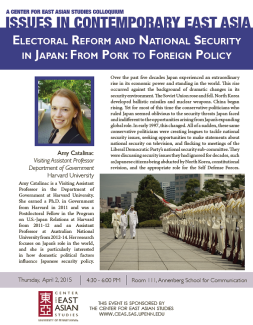Event

Over the past five decades Japan experienced an extraordinary rise in its economic power and standing in the world. This rise occurred against the background of dramatic changes in its security environment. The Soviet Union rose and fell. North Korea developed ballistic missiles and nuclear weapons. China began rising. Yet for most of this time the conservative politicians who ruled Japan seemed oblivious to the security threats Japan faced and indifferent to the opportunities arising from Japan’s expanding global role. In early 1997, this changed. All of a sudden, these same conservative politicians were creating leagues to tackle national security issues, seeking opportunities to make statements about national security on television, and flocking to meetings of the Liberal Democratic Party’s national security sub-committee. They were discussing security issues they had ignored for decades, such as Japanese citizens being abducted by North Korea, constitutional revision, and the appropriate role for the Self Defense Forces.
My book seeks to explain this turnaround. Using a wealth of new evidence, including quantitative analysis of 7,497 Japanese-language candidate election manifestos, 130,432 Japanese-language voter petitions, more than one hundred interviews with political actors in Japan, and firsthand observations of the election campaigns fought by conservative politicians in 2009, it argues that conservative Japanese politicians started paying attention to national security in 1997 because electoral reform in 1994 pushed them to shift their electoral strategies from pork to broad policy issues like national security. The finding that their turnaround in attention to national security was not “made in China” and had nothing to do with the threats posed by North Korea, China, or the capabilities and resolve of the United States to defend Japan is surprising, and changes our understanding of the determinants of Japanese security policy and security policies in democracies more generally.
Amy Catalinac is a Visiting Assistant Professor in the Department of Government at Harvard University. She earned a Ph.D. in Government from Harvard in 2011 and was a Postdoctoral Fellow in the Program on U.S.-Japan Relations at Harvard from 2011-12 and an Assistant Professor at Australian National University from 2012-14. Her research focuses on Japan’s role in the world, and she is particularly interested in how domestic political factors influence Japanese security policy. Her book is under contract at Cambridge University Press. Other work has been published in Foreign Policy Analysis, Politics and Policy, Japan Forum, and Political Science. She earned her B.A. Hons (first class) in Political Science from Victoria University of Wellington in 2003 and her B.A. in Japanese and Political Studies from the University of Otago in 2002, both in her native New Zealand. She studied at the University of Tokyo on the AIKOM program and again from on a Japanese Ministry of Education scholarship, during which time she served as an intern for Japan’s Liberal Democratic Party. She has taken 10 years of training in the Japanese language and has spent 5 years in Japan.
My book seeks to explain this turnaround. Using a wealth of new evidence, including quantitative analysis of 7,497 Japanese-language candidate election manifestos, 130,432 Japanese-language voter petitions, more than one hundred interviews with political actors in Japan, and firsthand observations of the election campaigns fought by conservative politicians in 2009, it argues that conservative Japanese politicians started paying attention to national security in 1997 because electoral reform in 1994 pushed them to shift their electoral strategies from pork to broad policy issues like national security. The finding that their turnaround in attention to national security was not “made in China” and had nothing to do with the threats posed by North Korea, China, or the capabilities and resolve of the United States to defend Japan is surprising, and changes our understanding of the determinants of Japanese security policy and security policies in democracies more generally.
Amy Catalinac is a Visiting Assistant Professor in the Department of Government at Harvard University. She earned a Ph.D. in Government from Harvard in 2011 and was a Postdoctoral Fellow in the Program on U.S.-Japan Relations at Harvard from 2011-12 and an Assistant Professor at Australian National University from 2012-14. Her research focuses on Japan’s role in the world, and she is particularly interested in how domestic political factors influence Japanese security policy. Her book is under contract at Cambridge University Press. Other work has been published in Foreign Policy Analysis, Politics and Policy, Japan Forum, and Political Science. She earned her B.A. Hons (first class) in Political Science from Victoria University of Wellington in 2003 and her B.A. in Japanese and Political Studies from the University of Otago in 2002, both in her native New Zealand. She studied at the University of Tokyo on the AIKOM program and again from on a Japanese Ministry of Education scholarship, during which time she served as an intern for Japan’s Liberal Democratic Party. She has taken 10 years of training in the Japanese language and has spent 5 years in Japan.